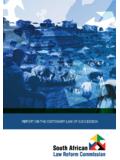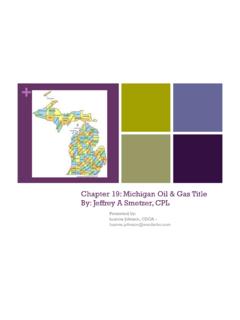Transcription of REPORT ON CONFLICTS OF LAW - Justice Home
1 PROJECT 90 THE HARMONISATION OF THECOMMON LAW AND THE INDIGENOUS LAW REPORT ONCONFLICTS OF LAWSOUTH AFRICAN LAW COMMISSIONPROJECT 90 THE HARMONISATION OF THE COMMON LAW AND THE INDIGENOUS LAW REPORTONCONFLICTS OF LAWS eptember 1999-iv-TO DR PM MADUNA, MP, MINISTER OF Justice ANDCONSTITUTIONAL DEVELOPMENTI am honoured to submit to you in terms of section 7(1) of the South African Law CommissionAct, 1973 (Act 19 of 1973), for your consideration the Commission s REPORT on CONFLICTS of MAHOMEDCHAIRPERSON: SA LAW COMMISSIONSEPTEMBER 1999-v-INTRODUCTION The South African Law Commission was established by the South African Law Commission Act,1973 (Act 19 of 1973).
2 The members of the Commission are -The Honourable Mr Justice I Mahomed (Chairperson)The Honourable Madam Justice JY Mokgoro (Vice-Chairperson)The Honourable Madam Justice LM MailulaProfessor RT NhlapoAdv JJ Gauntlett SCMs Z Seedat Mr P MojapeloThe Secretary is Mr W Henegan. The Commission s offices are on the 12th floor, Corner ofAndries and Schoeman Streets, Pretoria. Correspondence should be addressed to:The Secretary South African Law Commission Private Bag X668 PRETORIA0001 Telephone:(012) 322-6440 Telefax:(012) site: project leader responsible for this project is Professor RT Nhlapo. The researcher is Ms PMatshelo-Busakwe. The Commission wishes to express its gratitude to Professor TW Bennettfor the preparation of this REPORT .
3 This REPORT will be available on the Commission s Internet site once the Minister of Justice hasTabled the REPORT in Parliament. -vi-ACKNOWLEDGEMENT OF ASSISTANCEThe Commission gratefully acknowledges the financial grant from the Deutsche Gesellschaft f rTechnische Zusammenarbeit (GTZ) which enabled the Commission to conduct research, toprepare documents for discussion, to consult countrywide on its recommendations, and to printthis REPORT . -vii-CONTENTSPAGEI ntroductionvAcknowledgement of assistanceviiBibliographyxiSummary of recommendationsxivCHAPTER 1: THE GENERAL PRINCIPLES GOVERNINGAPPLICATION OF CUSTOMARY from the Issue analysis and comparative survey of laws5(1)Recognition of customary law in South Africaduring the colonial period5(2)The 1927 Native Administration Act.
4 Segregationand apartheid9(3)The 1988 Law of Evidence Amendment Act13(4)Comparison with the laws of other African (1)Implications of the Constitution for application of customary law21(2)Principles governing choice of law25(a)The nature of the conflict27(b)Parties may select the law to be applied28(c)Nature and form of a prior transaction31(d)Subject matter and environment of a transaction32(e)The litigants' cultural orientation32(f)Exemption from customary law34(g)Unifying choice of 2: THE `REPUGNANCY' from the Issue and comparative survey of 3: COMPETENCE OF THE COURTS TO APPLYCUSTOMARY AND COMMON from the Issue (1)Application of common law in civil cases45(2)Application of customary law in criminal cases48(3)Recognition of customary criminal 4: from the Issue 5: from the Issue survey and comparison with the laws of other African (1)Movable house property62(2)Land held under quitrent tenure64(3)Immovables and family property66(4)Guardianship 6: INTESTATE from the Issue (1)Foreigners73(2)Persons exempt from customary law74(3)Married persons74(a)Civil/Christian marriages in community of property75(b)Marriages out of community of property or undercustomary law78(c)Discarded wives.
5 The problem of dual marriages79(4)Unmarried persons81(5)The KwaZulu/Natal Codes81(6)Partial 7: CONFLICTS BETWEEN DIFFERENT SYSTEMS OFCUSTOMARY from the Issue with the laws of other African 8: CONFLICTS WITH FOREIGN SYSTEMS OF from the Issue 9: APPLICATION OF THE KWAZULU/NATAL CODESAND FORMER HOMELANDS from the Issue 10: PROOF AND ASCERTAINMENT OF CUSTOMARY from the Issue survey and comparison with the laws of other African A:Draft Bill109 ANNEXURE B:List of respondents who commented on Discussion Paper 76111-xii-BIBLIOGRAPHYA llott A N Essays in African Law, with special reference to the law of Ghana (1960)Butterworths London- New Essays in African Law (1970) Butterworths LondonArmstrong A K (ed) Women and Law in Southern Africa (1987) Zimbabwe Publishing HouseHarareBennett T W The Application of Customary Law in Southern Africa (1985) Juta & Co CapeTown- A Sourcebook of African Customary Law for Southern Africa (1991) Juta & Co CapeTown- Human Rights and African Customary Law (1995) Juta & Co Cape TownBrookes E The History of Native Policy in South Africa from 1830 to the Present Day (1924)
6 Nasionale Pers Cape TownBurman S B Cape Policies towards African Law in Cape Tribal Territories 1872-1883 (1973)unpublished PhD thesis Univ of Cape Town- Chiefdom, Politics and Alien Law - Basutoland under Cape Rule 1871-1884 (1981)Macmillan Press Ltd LondonChanock M L Law, Custom and Social Order, the colonial experience in Malawi and Zambia(1985) CUPC oertze R D Die Familie-, Erf- en Opvolgingsreg van die Bafokeng van Rustenburg (1971)SABRA PretoriaForsyth C F Private International Law 3ed (1996) Juta & Co Cape Town-xiii-Hahlo H R & E Kahn (eds) South Africa: the Development of its Laws and Constitution (1960)Juta Cape TownHailey Lord An African Survey: a study of problems arising in Africa south of the Sahara 2ed(1945) OUPHinz M O Customary Law in Namibia: Development and Perspective (1995) Namibia PapersWorking Document No 28 Centre for Applied Social Sciences WindhoekHirschon R (ed) Women and Property/Women as Property (1984) Croom Helm LondonHolleman J F Chief, Council and Commissioner: some problems of government in Rhodesia(1969) Royal Van Gorcum Ltd AssenKahn E (ed) The Quest for Justice .
7 Essays in honour of Michael McGregor Corbett (1995) Juta& Co Cape TownKerr A J The Customary Law of Immovable Property and of Succession 3ed (1990) Rhodes UnivGrahamstownKhumalo J A M Civil Practice and Procedure of all Courts for Blacks in Southern Africa 3ed(1984) Juta & Co Cape TownKoyana D S Customary Law in a Changing Society (1980) Juta & Co Cape TownLewin J Studies in African Native Law (1947) African Bookman Cape TownMann K & R Roberts Law in Colonial Africa (1991) Heinemann Portsmouth NH, James CurreyLondonOkoro N The Customary Laws of Succession in Eastern Nigeria and the statutory and judicialrules governing their application (1966) Sweet & Maxwell London-xiv-Olivier N J J et al Die Privaatreg van die Suid-Afrikaanse Bantoetaalsprekendes 3ed (1989)Butterworths DurbanPalmer V V & S M Poulter The Legal System of Lesotho (1972) Michie CharlottesvillePhillips A (ed) Survey of African Marriage and Family Life (1953) OUPP oulter S M Legal Dualism in Lesotho.
8 A study of the choice of law question in family matters(1979) Morija Sesuto Book Depot MorijaRaum O F & E J De Jager Transition and Change in a Rural Community (1972) Fort Hare UPAliceRogers H Native Administration in the Union of South Africa 2ed (1949) Government PrinterPretoriaSalacuse J W Introduction to Law in French-speaking Africa (1969) Michie CharlottesvilleSanders A J G M (ed) The Internal Conflict of Laws in South Africa (1990) Butterworths DurbanSinclair J D (assisted by J Heaton) The Law of Marriage vol 1 (1996) Juta & CoSouth Africa Commission of Inquiry into the Structure and Functioning of the Court (the`Hoexter Commission') REPORT (1983) Government Printer PretoriaSouth African Law Commission Review of the Law of Succession.
9 The introduction of alegitimate portion or the granting of a right to maintenance to the surviving spouse (1987)Project 22 Government Printer Pretoria-xv-South African Law Commission REPORT on Customary Marriages (1998) Project 90 TheHarmonisation of the Common Law and Indigenous Law Government Printer PretoriaTwining W The Place of Customary Law in the National Legal Systems of East Africa (1963)Law School Chicago UPUniversity of Ife (Institute of African Studies) Integration of Customary and Modern LegalSystems in Africa (1964) Ife UP & Africana Publishing Ile-Ife & New YorkVan der Westhuizen J et al (eds) Paul van Warmelo: huldigingsbundel (1984) Univ of SAPretoriaWelsh D The Roots of Segregation: native policy in colonial Natal 1845-1910 2ed (1973) OUPCape TownZambia Government Law Development Commission REPORT on the Law of Succession (1982)Government Printer Lusaka-xvi-SUMMARY OF RECOMMENDATIONSC ourts and litigants need clear and explicit choice of law rules to indicate when common orcustomary law will be applicable to the facts of a particular case.
10 A new enactment devotedexclusively to the application of customary law is now needed in order to disentangle choice oflaw rules from the two statutes currently regulating this issue: the Black Administration Act(which has close association with the policies of segregation and apartheid) and the Law ofEvidence Amendment Act (which is mainly concerned with ways of proving foreign andcustomary systems of law). The REPORT makes the following principles governing application of customary lawApplication of customary law should remain a matter of judicial discretion, but more exact guidesto choice of law are necessary to bring certainty to an issue that is currently vague and guides should be precise, flexible, simple and in keeping with the way in which courts havebeen used to solving choice of law new choice of law rules should indicate that parties are free to agree on the law that best suitstheir needs.
















